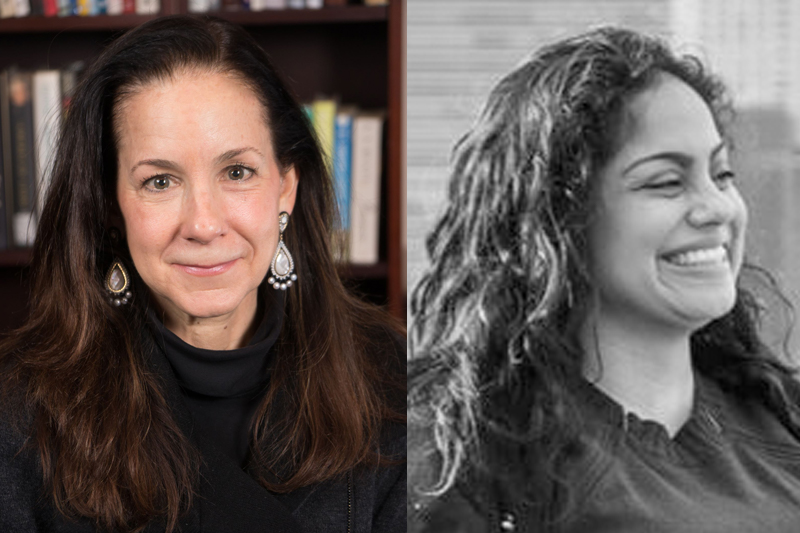Cancelled standardized tests during the pandemic, combined with ongoing reminders of racial injustice, have created opportunities to take “radical, new approaches” to anti-racist education, according to a new policy report authored for The Century Foundation by Teachers College’s Amy Stuart Wells, Professor of Sociology & Education, and Diana Cordova-Cobo, a TC doctoral student and researcher.
The Post-Pandemic Pathway to Anti-Racist Education: Building a Coalition Across Progressive, Multicultural, Culturally Responsive, and Ethnic Studies Advocates, published this past week, provides a pathway for schools to move away from their heavy focus on standardized tests that was the norm before the pandemic, and toward developing a student-centered movement that will — by necessity — emphasize anti-racist principles and practices in post-pandemic schools.

WORKING FOR THE PUBLIC GOOD Amy Stuart Wells (left) and Diana Cordova-Cobo both work closely, through the Public Good initiative created by Wells, with public schools striving to become more anti-racist and culturally relevant in their teaching and learning strategies. (Photos: TC Archives)
“When all of our public schools reopen in the fall, we should not return to ‘normal’ or ‘business as usual,’” write Wells and Cordova-Cobo. “Rather, we need to shift our focus from standardized testing to students' social and emotional development.”
Post-pandemic schools should be student-centered, de-emphasize standardized testing, and be overtly anti-racist, they assert. Central to the new focus on students is the need to “address issues of race, racism, and racial inequality head on, and demonstrate the benefits of anti-racist teaching for all children.”
In fact, a central argument that the authors make is that teachers cannot be student-centered and focused on the social and emotional needs of students if they are not taking into account issues of race and culture and how they affect students’ school experiences.
In order to shift the field in this anti-racist direction, the authors propose combining four of the strongest educational reform movements at work in the United States today: progressive education; critical multicultural education; culturally relevant, responsive, and sustaining education; and ethnic studies.
“The time, conditions, and rationale are right to merge these four major strategies of education reform into a fully-fledged, student-centered and anti-racist educational reform movement,” Wells and Cordova-Cobo write.
Progressive education, the oldest and most widely practiced of the four reform strategies, was created around the turn of the 20th century in large part by the influential philosopher John Dewey at Teachers College. Progressive education emphasizes “hands-on, project-based learning tied to students’ experiences and focused on developing the emotional, artistic, and creative aspects of children’s personalities.” To succeed, it requires student cooperation in “constructing the purposes of their study,” Wells and Cordova-Cobo write.
When all of our public schools reopen in the fall, we should not return to ‘normal’ or ‘business as usual. Rather, we need to shift our focus from standardized testing to students' social and emotional development.
—Amy Stuart Wells and Diana Cordova-Cobo
Ethnic studies, popularized in the 1960’s by the Black Studies, Latino/Chicano Studies, Asian-American Studies, and Native American Studies movements in higher education, challenges categorization of people according to race, class or gender, and “deconstructs structural forms of domination,” according to the authors.
Multicultural education was created in the 1970’s with an initially broad constituency but became less popular as desegregation policies faded. Culturally relevant and responsive pedagogies, created in the 1990’s and popular today, affirm students’ cultural knowledge and develop the critical consciousness to “challenge the status quo.”
All four approaches are “supported by the research on child development, brain science, learning theory, pedagogy and policy,” the authors note, and none are new to education. But the proponents of each approach have divided into separate camps that have not worked together to challenge the nation’s predominant emphasis on standardized testing. If they joined forces, they could influence policy that could “make the educational system less dependent on and defined by standardized tests” and make schools “more effective and emancipatory experiences for young people.”
At the federal level, the authors argue that the Every Student Succeeds Act (ESSA) should promote more state and local flexibility on standardized testing and accountability measures, including more capacity building and non-punitive measures of assessing what is needed. State ESSA plans should require “some aspect of cultural responsiveness or competence.”
States should also step up their professional development offerings for teachers, write Wells and Cordova-Cobo — especially in high-need, low-income school districts — emphasizing ethnic studies and modeling “culturally relevant, responsive and sustaining pedagogy.” Teachers College’s annual Reimagining Education: Teaching, Learning and Leading for a Racially Just Society Summer Institute (RESI) at Teachers College, directed by Wells, “is one such option, but there are others,” the authors write. Local school districts should create “local guidelines that support antiracist education in...curriculum, pedagogy, discipline policies, and parent and community engagement.” [This year’s RESI will be held virtually from July 12-16.]
Another upcoming event organized by Teachers College is the Gordon Centennial Conference, which will be hosted by Teachers College on June 2nd and 3rd, where leading education scholars will gather to help the pioneering TC psychologist Edmund Gordon celebrate his 100th birthday, discuss his legacy as a scholar and champion of educational equity and community activism. An important aspect of the conference will be to consider how to apply Dr. Gordon’s ideas to rebuild assessment from the ground up and use standardized tests as measures of how to support instead of judge student learning.
We know the role that culture and racial identity can play in a student’s educational experience, and understand that intelligence and ability can never be measured by a single test score. This is just good education—what we should want for all of our children.
—Amy Stuart Wells and Diana Cordova-Cobo
As they reboot the nation’s post-pandemic schools, educators and policymakers have “the perfect opportunity” to make anti-racist and culturally relevant “changes to their standards, curriculum and testing,” Wells and Cordova-Cobo assert.
Both authors work closely with public schools striving to become more anti-racist and culturally relevant in their teaching and learning strategies through TC’s Public Good Project, so they know first-hand the tension schools face between meeting state testing mandates and meeting the social and emotional needs of students. They note that if there is any moment to question the veracity of the education assessment policies of the last 30 years, it is now.
“We know the role that culture and racial identity can play in a student’s educational experience, and understand that intelligence and ability can never be measured by a single test score. This is just good education what we should want for all of our children.”
